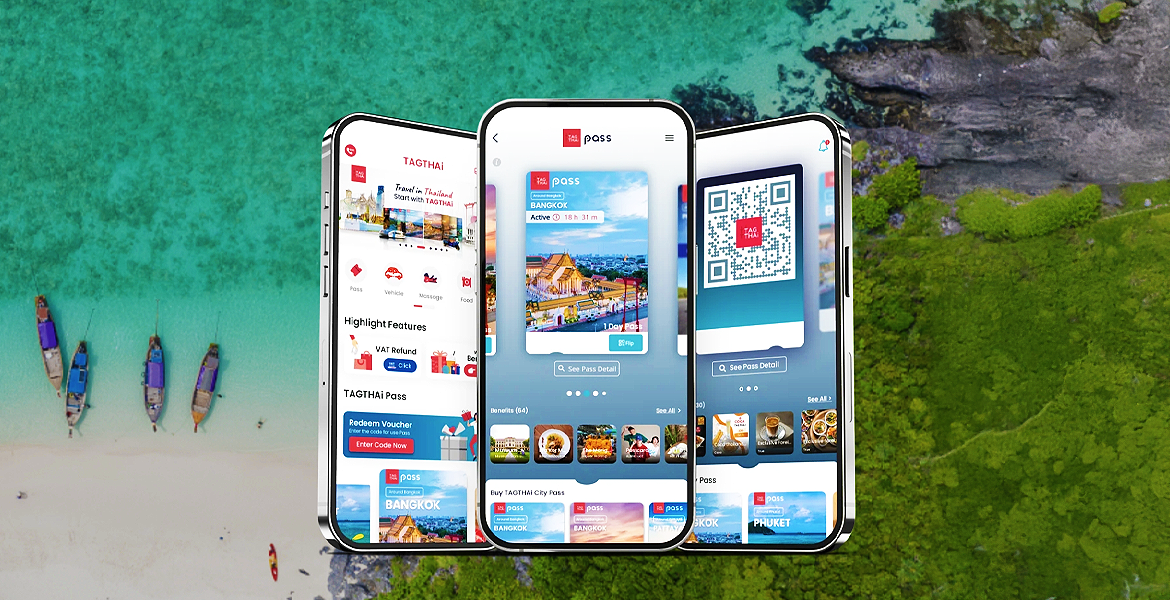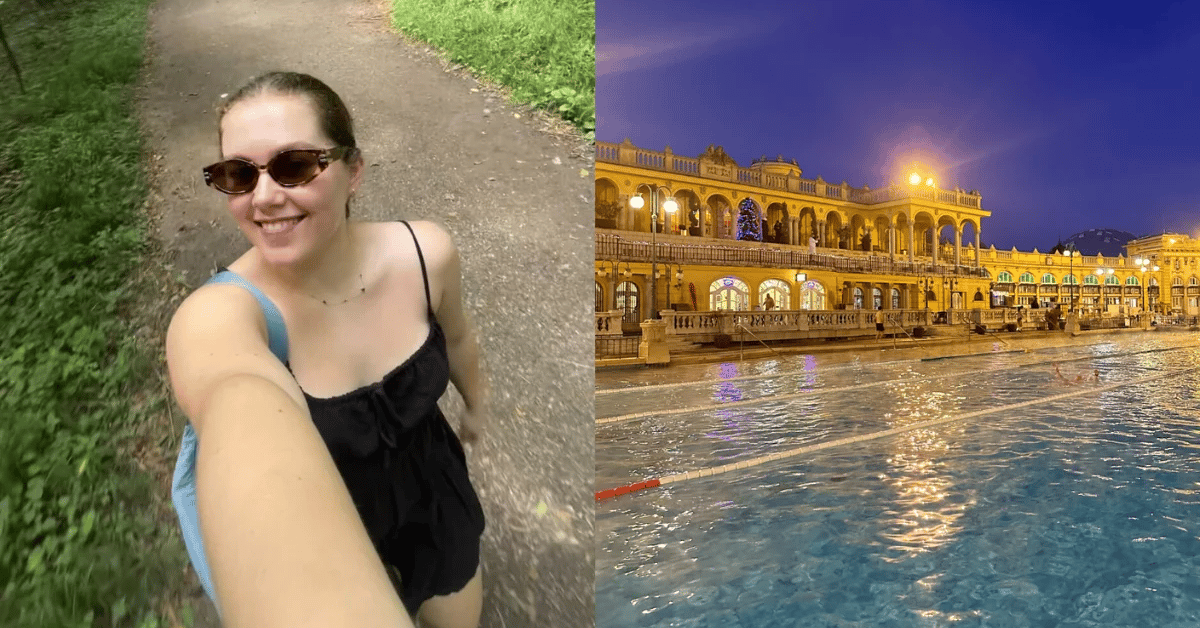Trip Planning
TAGTHAi, Thailand’s travel app, launches AI-powered Design My Trip tool

Partnership with Google Cloud will see itinerary-generation app go beyond Bangkok; multi languages in the pipeline
TAGTHAi, a travel app that’s a collaboration between the Thai government and the private sector to make travelling in Thailand simple and convenient, has signed a strategic partnership with Google Cloud to launch a tool called ‘Design My Trip’.
Utilizing Vertex AI, Google Cloud’s enterprise AI platform, and Google’s first-party foundation models like Gemini – TAGTHAi has built the generative AI (gen AI)-powered capability accessible through the TAGTHAi mobile app. This tool enables travellers to create personalized trip itineraries within seconds.
Thiratida Kuvantharai, chief executive officer, Thai Digital Platform Social Enterprise Co., Ltd. (TAGTHAi), said: “TAGTHAi is committed to harnessing data-driven technologies to offer curated journeys that resonate with every traveler. This aligns with the Tourism Authority of Thailand’s (TAT) goal of digitally transforming the local tourism ecosystem to reinforce Thailand’s position as a leading destination and drive high-value growth across the sector.
“With Google Cloud as our AI innovation partner, we’re proactively addressing a major pain point faced by international visitors: navigating where to go in Thailand, and how, due to the overwhelming complexity associated with finding reliable in-destination-related information that’s scattered across numerous online platforms.
“We’ve developed Design My Trip to distill these complexities into personalized trip plans that guide travelers every step of the way, reducing travel anxiety and ensuring that they can easily discover and enjoy the rich tapestry of high-quality attractions and experiences that Thailand has to offer.”
The early-access version of Design My Trip, initially released in June, helps travelers create tailored one-to-three-day itineraries for visits to the Bangkok Metropolitan Region. Users select their specific interests, such as “massage and spa,” “Michelin food,” or “Skywalk,” and the AI-powered tool instantly generates a personalized trip plan.
Design My Trip is integrated with TAGTHAi’s databases of travel insights, sourced from TAGTHAi’s 48 public and private sector partners across the country.
This information is streamed in near real-time to BigQuery, Google Cloud’s unified data platform, to ensure that the app has access to the most up-to-date insights when crafting itineraries. When a traveler selects their specific interests on the Design My Trip interface, the tool leverages this integration to generate itineraries using the data from the TAGTHAi databases.
Kanokwan Boonchai, Chief Operating and Technology Officer, Thai Digital Platform Social Enterprise Co., Ltd. (TAGTHAi), said: “Google Cloud’s integrated data and AI capabilities and deep expertise in gen AI operations were instrumental in bringing Design My Trip to life. We were able to go from concept to production-ready solution in just four months – a feat we initially believed would take years.
“This was made possible by Google Cloud’s ability to streamline the creation of data-to-AI workflows that power Design My Trip while efficiently processing the massive volume of data from our numerous partners. Most importantly, Vertex AI provides built-in tools for monitoring and evaluating model performance, which is crucial for maintaining the quality and accuracy of AI-generated itineraries. The early-access version of Design My Trip has already delighted users, with 90% expressing their satisfaction with the tool in a recent survey. We now look forward to continuing our collaboration with Google Cloud to innovate quickly and deliver new features that exceed user expectations.”
Annop Siritikul, Country Director, Thailand, Google Cloud, said: “TAGTHAi’s adoption of gen AI to power Design My Trip has resulted in positive user sentiment and increased purchases of its all-in-one travel pass offerings. This success is an example of the real-world business impact that organizations are seeing as they move their gen AI projects from proof-of-concept into production.
“TAGTHAi recognizes that successful AI adoption goes beyond just having access to capable models. It’s about grounding the models in high-quality enterprise data and using these connections to steer model behavior, thereby creating more accurate and relevant gen AI-powered experiences for customers. As Thailand looks to sustain its growth in international tourism, we look forward to continuing to help TAGTHAi and the broader travel ecosystem elevate their digital competitiveness and drive tangible business results with the industry’s most enterprise-ready gen AI platform.”
The full-featured version of Design My Trip, slated for release later this year, will offer expanded capabilities, allowing users to generate itineraries for longer trips and cover more points of interest and Thai provinces, such as Chiang Mai and Phuket. It will also allow users to further customize their AI-generated itineraries and share them with others for easier group travel planning. The itineraries will offer the option of directly purchasing and storing e-tickets to attractions and activities within the TAGTHAi app, ensuring a secure and convenient booking experience with all travel confirmations in one place.
Design My Trip is currently available in English and Thai. In the future, TAGTHAi plans to leverage the Gemini models’ multi-language capabilities to generate travel itineraries and other content in Chinese, Japanese, Korean, and other languages, to cater to a broader range of overseas visitors.

Trip Planning
Royal Caribbean removes one of its most popular ports from cruise itinerary – booked passengers have no say

ROYAL Caribbean bosses are to remove a popular tourist destination from the company’s travel itineraries.
Officials said the decision was made out of caution.
Royal Caribbean bosses are continuing to pause visits to Labadee – a plush, private resort located off Haiti’s northern coastline.
Trips to Labadee have been paused at intervals over the last year.
Last summer, bosses at the cruise company paused trips to Labadee until September 2024.
In April, chiefs announced visits to the Haitian island would be halted.
And, now this pause has been extended to October, according to USA Today.
The move was made out of “an abundance of caution,” a spokesperson told the outlet.
“We have communicated with guests directly on this change.”
Americans are urged not to travel to Haiti.
The State Department has issued a Level 4 travel advisory.
Level 4 travel advisories are issued because of the life-threatening risks posed to travelers.
Syria, Iraq, Russia, Venezuela, Lebanon, and Somalia are other countries under a Level 4 warning.
Officials have warned how Americans who visit Haiti may be at risk of kidnapping.
Kidnappers on the island are known to target and attack convoys.
Travelers have been warned not to cross the land border between Haiti and the Dominican Republic.
US Department of State Travel Warnings
THE State Department uses a four level system to issue travel advisories.
Here is what each level means.
- Level 1 – Exercise normal precautions – This is the lowest advisory level for safety and security risks. There is some risk in any international travel, and conditions in other countries may differ from those in the United States.
- Level 2 – Exercise increased caution – Be aware of increased risks to safety and security. Specific risks are described in the Travel Advisory.
- Level 3 – Reconsider travel – Reconsider your travel to the destination due to serious risks to safety and security. Specific risks are described in the Travel Advisory.
- Level 4 – Do not travel – This is the highest advisory level due to life-threatening risks. Specific risks are described in the Travel Advisory. The U.S. government may have very limited or no ability to help, including during an emergency. We advise that U.S. citizens do not travel to the country, or to leave as soon as it is safe to do so.
Source: US Department of State
And, the families of kidnapping victims have been forced to pay up to hundreds of thousands of dollars to ensure people have been released.
Americans have been told not to travel to the island due to the threats of crime, terrorist activity, unrest, and limited health care resources.
Officials have also warned about the risks of gang violence outside the main airport in Port-au-Prince.
Haiti has been under a state of emergency since March 2024.
Americans considering traveling to Haiti are encouraged to set up a point of contact before leaving for the island.
And, they should create a will before leaving the US.
Travelers should also leave DNA samples with their medical provider just in case they are needed by family members, according to the State Department.
Drivers should always keep their cars locked, be alert, and never travel alone.
Trip Planning
More Aussies are using AI to plan holidays, from scoring deals to assembling itineraries

I’m planning a trip to Iceland, aka one of the most expensive countries in the world.
Can I afford to go? What would a realistic budget look like for a two-week holiday? How can I cut corners to save some cash?
I decide to do the 2025 equivalent of phoning a friend — I ask my buddy ChatGPT.
My initial prompt is too vague and it gives pricing in USD, which isn’t particularly helpful. I refine my criteria, asking for a rough total in AUD for a fortnight in September, departing from Perth (“please”, I add, because manners are still important when talking to a robot).
In the blink of an eye, Chat spits out a breakdown of average costs on everything from flights to accommodation, car rental, food and activities.
There are three tiers for backpacker, mid-range and luxury travel and an option to split components if I have a travelling companion.
It even offers suggestions for making my hard-earned coin stretch further, like buying groceries rather than eating out and opting to self-drive rather than joining a guided tour of the famous Golden Circle.
All in all, Chat reckons I’ll need to save $8500-$9000 to make Iceland happen.
What would have taken me hours of research and a lot of math just to ascertain whether I can even consider the trip in the first place was reduced to mere minutes.
Cutting corners, cyber style
While I want to give myself a pat on the back for being so resourceful — there’s a certain smugness that comes with finding a sneaky shortcut — I am hardly the first to use ChatGPT for travel tips.
In recent research conducted by Compare the Market, nearly a third of those surveyed admitted to using artificial intelligence to plan their holidays.
These Aussie respondents said they outsourced a range of tasks to AI, with the most common being destination recommendations, hunting for deals, seeking activities and finding accommodation.
Others reported they used AI to quickly create itineraries, scour flights or transport and understand currency conversion.
The data also gave insight into how different generations are embracing the technology — or not.
Perhaps unsurprisingly, gen Z and millennials are spearheading the adoption of AI when it comes to concocting their dream vacation, with 52 per cent and 44 per cent respectively utilising the tool to plan a holiday.
Meanwhile, 93 per cent of baby boomers and 76 per cent of gen X respondents said they were resistant to bringing AI into their trip arrangements.
Compare the Market’s Chris Ford says the stats reflect how we engage with the ever-changing tech landscape.
“Our latest data highlights a shift in the way travellers are approaching their planning, with convenience, personalisation and speed driving the adoption of innovative AI tools,” he says.
“It’s likely that travellers are using these tools in addition to chatting with travel agents, conducting desktop research or seeking ideas and inspiration from social media.
“AI is evolving at a rapid rate and as it becomes more accessible and intuitive, it’s not surprising that travellers are relying on new technology to help shape their dream holidays.”
But the insurer warns against taking AI’s word as gospel.
With nothing to validate the credibility of such recommendations, Ford says travellers need to practice due diligence.
“AI can be a great starting point when planning a holiday, but always ensure you’re crossing your ‘t’s and dotting your ‘i’s,” he says.
“Many of these tools and services are still in their infancy stage and may not be 100 per cent accurate, so do your own research to ensure you’re equipped with the right tools and information for your trip.
“The last thing we want to see is anyone getting themselves into a potentially dangerous or unsafe situation based on the recommendations from AI.”
The virtual line in the sand
Ford makes a crucial point here about our relationship with platforms like ChatGPT.
Rather than approaching them as one-stop-shop to curate every element of our holiday, we should instead consider them as a starting point to kick off deeper research.
After all, isn’t that part of the fun with travel — the anticipation in the lead-up, the process of discovering a destination before we have arrived and assembling a bucket list tailored to our specific taste?
By asking a computer to generate an itinerary based on what’s popular, we are depriving ourselves of creativity, spontaneity and adventure.
We must also remember that what the AI bot spits out is dependent on the quality of our prompts.
The more we refine our request, the more likely we will receive helpful answers, but even then things can go wonky.
Take this from my colleague Belle: “I asked ChatGPT to give me a child-friendly restaurant in Ubud. It sent me to a weird health food restaurant with a koi pond where you couldn’t wear shoes. My feral children cleared the room within minutes. Disaster.”
Then there’s the cognitive dissonance that comes with considering the environmental impact of AI versus the fear of being left behind if we don’t get on board with this technology.
Like it or not, it is shaping and re-shaping the future at breakneck speed.
We all have to decide where our (virtual) line in the sand is: what is productive and “mindful” use based on our needs and values.
For me, I’m OK with employing ChatGPT to whip up a quick budget so I can take the holiday to Iceland I’ve always dreamed of.
But when it asks if I want activity recommendations or a detailed itinerary next, I politely decline. I’d rather leave some room for mystery and exploration.
“Thanks”, I farewell my cyber mate in my sign-off (because, manners).
What the team thinks
Our collective of writers just so happens to represent the four age demographics mentioned in the research above. So what’s the hot take?
Stephen Scourfield — baby boomer
Trusting someone – or, in this case, something – to book a holiday (particularly a family holiday!) requires a lot of trust.
If some detail is missed in the booking process (a wrong date, a badly timed connection), it will be you standing there, somewhere, trying to fix it (possibly with the family “on your case”).
Would I trust AI yet?
No – not yet.
Of course, I think we all know that AI is good at doing grunt work and it is up to us to check details. So AI is already useful for the broad-brush, first sweep of mapping out a holiday.
But AI won’t then back itself by booking it all. (That will be the game changer.)
So, at this stage, AI, for me, is still a basic tool of research – not a replacement for an experienced and knowledgeable travel agent.
Leyanne Baillie — gen X
Although my generation is confident when it comes to using tech (even if we’re not digital natives), I think AI programs would be more effort than they’re worth.
I know it could be a time-saver in terms of journey-planning brainstorming and getting a rough guide of options, but I’d still want to tailor my itinerary to cater to my personal taste.
I don’t think I’m ready to hand over the reins completely to artificial intelligence just yet.
Jessie Stoelwinder — millennial
I love a good travel hack, and that’s how I have been approaching my use of AI.
Anything that makes life a little easier and frees me up to investigate the fun stuff — where to eat, hike, shop, people-watch etc. — and I am on board.
I’ve used ChatGPT to quickly aggregate travel data for personal trips to assist with admin, logistics and practicalities, which I will then cross-check and verify to make sure the information works for me.
Recommendations, however? Word of mouth and insider intel from a human being will always win, in my opinion.
Megan French — gen Z
I would be open to the idea of utilising AI when planning my travels but I’d take everything it recommends with a grain of salt while still doing my own thorough research.
I think it’s great for foundational information-based planning early in trip preparations, such as “what holidays are on in India during July and how is best to navigate them?”
But when it comes to booking flights and accommodation, I’d go nowhere near AI … yet.
Trip Planning
Why Budapest is Europe’s most underrated city: travel guide.

My hostel was minutes from the Danube, on the Pest side and just a perfect location. A little bit further from the city but accessible via tram, scooter, or bike and still within walking distance of great restaurants, bars and sights.
Plus, if you, like me, crave some Asian cuisine while wandering the cities of Europe, Budapest has a surprisingly incredible selection of small restaurants to try. My personal favourite was PHỞ 18 Budapest — you can thank me later.
What to do in Budapest.
Budapest is so large, and with so much to do, it’d take a tightly packed itinerary to get it all done in a few days. But here are a few of my non-negotiables.
Firstly, walk around. In my humble opinion, there is no better way to get a feel for a new city than by roaming the streets and taking in the sights on foot. Especially in Budapest, a city that can capture your imagination at every corner. Crossing the Liberty Bridge and seeing both sides of the city unfold before your eyes is an experience not easily forgotten.
On my first morning, I walked up to Buda Castle and explored the grounds and museums before hiring a scooter and making my way back to my accommodation.
Image: Supplied.
-

 Brand Stories2 weeks ago
Brand Stories2 weeks agoBloom Hotels: A Modern Vision of Hospitality Redefining Travel
-

 Brand Stories1 week ago
Brand Stories1 week agoCheQin.ai sets a new standard for hotel booking with its AI capabilities: empowering travellers to bargain, choose the best, and book with clarity.
-

 Destinations & Things To Do2 weeks ago
Destinations & Things To Do2 weeks agoUntouched Destinations: Stunning Hidden Gems You Must Visit
-

 Destinations & Things To Do1 week ago
Destinations & Things To Do1 week agoThis Hidden Beach in India Glows at Night-But Only in One Secret Season
-

 AI in Travel2 weeks ago
AI in Travel2 weeks agoAI Travel Revolution: Must-Have Guide to the Best Experience
-

 Brand Stories1 month ago
Brand Stories1 month agoVoice AI Startup ElevenLabs Plans to Add Hubs Around the World
-

 Brand Stories3 weeks ago
Brand Stories3 weeks agoHow Elon Musk’s rogue Grok chatbot became a cautionary AI tale
-

 Asia Travel Pulse1 month ago
Asia Travel Pulse1 month agoLooking For Adventure In Asia? Here Are 7 Epic Destinations You Need To Experience At Least Once – Zee News
-

 AI in Travel1 month ago
AI in Travel1 month ago‘Will AI take my job?’ A trip to a Beijing fortune-telling bar to see what lies ahead | China
-

 Brand Stories2 weeks ago
Brand Stories2 weeks agoContactless Hospitality: Why Remote Management Technology Is Key to Seamless Guest Experiences